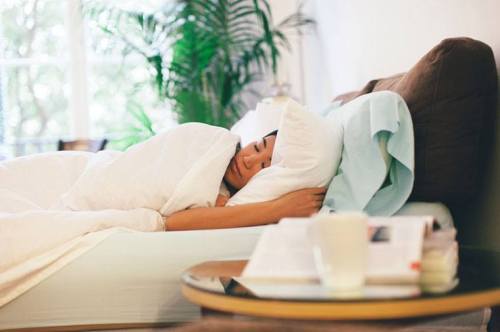Can’t catch enough zzz’s? Magnesium might be the all-natural sleep aid you need in your life
Can magnesium help you sleep? Get all the deets on this buzzy supplement.

When it comes to sleep, you may feel like you’re doing everything right. You’ve cleaned up your pre-bedtime routine, invested in an organic mattress, sheets, and pillow trifecta, and found the perfect sleep position for you. But if you often find yourself laying in bed awake, staring at the ceiling wondering Whyyy, you might be low on a certain key mineral.
“A magnesium deficiency can be a contributor to poor or troubled sleep,” says Courtney Bancroft, a licensed clinical psychologist and insomnia specialist. That’s because, according to medical nutritionist Sarah Brewer, “magnesium is needed for over 300 body enzymes to work properly, including the production of many brain chemicals such as melatonin, which controls the quality of your sleep.” Plus, magnesium has a natural relaxing effect on the body. It binds to GABA (gamma-aminobutyric acid) receptors in your brain to aid in calming activity and quieting the nervous system, explains Bancroft.
“Magnesium is needed for over 300 body enzymes to work properly.”
Along with less than stellar sleep, a magnesium deficiency can also suck the energy out of you (literally) when you’re awake. “Low magnesium intakes are linked with reduced cell energy production and chronic fatigue as well as serotonin levels, which helps maintain a balanced mood,” says Brewer.
While you may be able to get ample magnesium from your diet (kale and avocados for the #win), up to 80 percent of people are coming up short, says Frank Lipman, MD, a Well+Good Council member. “Alcohol can deplete magnesium levels because it increases excretion of the mineral via urine, while coffee has a similar effect as it exits the kidneys,” he explains. According to Dr. Lipman, stress can also contribute to lower-than-recommended magnesium supplies.
Enter: the supplement. Studies have shown that taking a daily dose of magnesium can improve your likelihood of falling and staying asleep by helping to chill out your parasympathetic nervous system and relax your muscles. “As with most minerals and nutrients, food sources are always best, but because many people are deficient in magnesium, it can be really beneficial to supplement with it in the right dosages,” says Dr. Lipman. Keep in mind that the more magnesium you get from your diet, the less you’ll need from a supplement, which is why experts advise you get blood work to check your magnesium levels so you know if you’re deficient in the first place.
A daily dose of magnesium can improve your likelihood of falling and staying asleep by helping to chill out your parasympathetic nervous system and relax your muscles.
The only pitfall of adding the mineral supplement to your daily routine? It may have you running to the bathroom more often than you might like because it stimulates intestinal contractions. So if your stomach is in knots over the idea of an emergency number two situation, Brewer suggests rubbing some magnesium oil onto your skin or soaking in a bath of magnesium salts (like Epsom or Dead Sea) before bed. The magnesium in these soaks can actually seep into your skin and enter your bloodstream, delivering a similar Zenned-out effect as an oral supplement.
And remember, to get the max out of magnesium, be consistent with when you take it as well as the dosage. Having stable levels of magnesium in your body is what will help you sleep even better overall, says Bancroft.
Originally published on November 1, 2017. Updated on September 26, 2018.
Now, all you need to do is add some lavender and peppermint essential oil and a quick, Elle Macpherson-approved yoga pose to your nightly routine and you’ll never feel sleep-drunk at work again.
Sign Up for Our Daily Newsletter
Get all the latest in wellness, trends, food, fitness, beauty, and more delivered right to your inbox.
Got it, you've been added to our email list.










